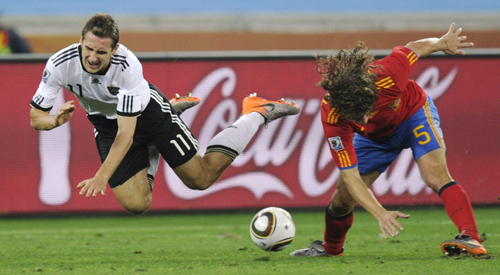
So Klose, but so far away
Twinkle, twinkle, little star, just barely out of reach you are.
This seems to be the new anthem of the German national soccer team, as they are finding it ever so difficult to find that elusive fourth World Cup star – a pinnacle which has eluded them for two dreadfully long decades.
The German squad entered the 2010 FIFA World Cup looking to exorcize their recent demons in international play. Unfortunately, it all came to a crashing halt Wednesday, with a 1-0 semi-final loss to Spain.
“I was watching the game in a bar in Cologne,” said German supporter Maximilian Recht. “When Spain scored, everybody was really quiet and remained so for the final 20 minutes of the game.”
Unless we’re of German descent, across the pond here in North America we don’t know a heck of a lot about Germany other than the typical stereotypes of sausage, schnitzel and sauerkraut. We may know how to count to drei, and we likely have at least one friend who has been to Oktoberfest.
But one thing that we do, or at least should know, is that the German soccer club has been a force to be reckoned with long before Nena starting singing about 100 or so air balloons.
The black, red and gold nation took to the pitch in South Africa carrying heavy baggage from their last two appearances on this stage. The club fell to Brazil in the 2002 final – a match in which they were forced to go at it without coveted midfielder Michael Ballack – and, with hopes high as the host nation in 2006, were knocked out in an agonizing semi-final defeat to thedestiny-chasing Italians.
[php snippet=1]
As if that weren’t enough, their final international tournament prior to South Africa – the 2008 European Championship – saw the Germans finishing as runners-up after dropping a 1-0 decision to Spain in the final.
“It’s frustrating to continually come up short,” said Recht, “but we have to admit that there always seems to be a team that plays a little better.”
Entering into the 2010 World Cup tournament, Germany was haunted by visions of Fabio Grosso curling a shot passed a helpless Jens Lehman in the 119th minute. However, those nightmares dissipated quickly, as the defending champion Azzuri went out in the group stage with little more than a whimper – an embarassing showing at best.
2006 runners-up France exited in similar fashion.
So, with two European heavyweights out of the picture, the door creeped further open for Germany to make their mark in 2010.
Even without captain Ballack at their disposal, forced to sit out the tourney with an injury, ‘Die Mannschaft’ were looking quite impressive, finishing atop their grouping with six points and outscoring their opposition 5-1.
Enter the knockout stage.
Here, the offensively-gifted Germans took the nation of South Africa for a grandioso ride, disposing of powerhouses England and Argentina by a combined score of 8-1.
“After the games against England and Argentina, nobody had any doubt they would win against Spain and the Netherlands,” said Recht.
Striker Miroslav Klose celebrated his 100th international cap in the quarter-final win over the Argentines, and was looking true to form, sniping his third goal of the tournament and 14th in World Cup play, tieing the record held by German legend Gerd Muller.
Up-and-comer Thomas Muller was also looking impressive, having tallied four goals of his own in the tournament. However, in the semifinal against Spain, Muller was forced to watch from the sidelines due to a pair of yellow cards conceded in earlier play.
While Germany certainly has the talent to find offense from other areas, Klose simply could not find any magic in this game and, with little help, could not carry the offensive burden against the Spaniards, and it was dj vu all over again in Deutschland.
“Spain didn’t let Germany play their game,” explained Recht. “Their midfield was too strong and they were too dominant.
“I think it was hard for Klose because the midfield couldn’t manage to give him the ball in good positions.”
Whether their dj vu is in the form of losing out 1-0 to Spain – an identical defeat to the Euro final two years prior – or a second consecutive semifinal fallout in World Cup play, there is little consolation for the German side.
Where was the offensive explosion we had seen from them in the tournament prior to this point? Why did they fail to play to that potential against Spain? No one really knows.
All we do know is that for the second time in a row, Germany will be playing in the third-place matchup, rather than the World Cup final.
Sure, pride will be on the line when they square off with Uruguay on Saturday, but what does this game really mean? Honestly, not much. For Germany, 1990 is a long time ago, and the nation is aching for a taste of modern day World Cup glory.
The road has not been easy, with many bitter defeats staring them in the face – so close on so many occasions, but falling just shy of the mark. Now, they have to wait another four years to try their hand on the world’s grandest stage. 32 teams will take to the pitch in Brazil in 2014 and, win or lose, Germany’s World Cup drought will have expanded to just shy of a quarter century.
You know that saying, the third time’s a charm? Well, for Germany, the fourth time is proving nothing short of a nightmare.
[php snippet=1]

